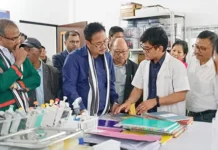[ Tongam Rina ]
ITANAGAR, Dec 8: Union Home Minister Amit Shah is set to introduce the citizenship amendment bill (CAB), which seeks to grant Indian citizenship to non-Muslim refugees from Afghanistan, Bangladesh and Pakistan, in the Lok Sabha on Monday.
According to the Lok Sabha’s list of business for Monday, the bill to amend the Citizenship Act, 1955, is listed at Item 20 and will be moved for passage the same day.
The new bill, which replaces the Citizenship (Amendment) Bill, 2016, which has lapsed, has considerable changes with regard to the tribal areas protected by the 6th schedule of the constitution, and areas under the Bengal Eastern Frontier Regulation (BEFR), 1873.
Arunachal, Nagaland and Mizoram, which have the inner line permit (ILP) regime, have been exempted from the bill, and so have the tribal areas under the 6th schedule in Assam, Meghalaya, Mizoram and Tripura under Clause 6B (4). The bill states that “nothing in this section shall apply to tribal areas of Assam, Meghalaya, Mizoram or Tripura as included in the 6th schedule to the constitution and the area covered under the inner line notified under the Bengal Eastern Frontier Regulation, 1873.”
Hindus, Buddhists, Christians, Jains, Parsis and Sikhs who have come from Afghanistan, Pakistan and Bangladesh prior to 31 December, 2014, owing to religious persecution in those countries, will not be treated as illegal immigrants but given Indian citizenship, according to the bill.
“Provided that any person belonging to Hindu, Sikh, Buddhist, Jain, Parsi or Christian community from Afghanistan, Bangladesh or Pakistan who entered into India or before the 31st day of December, 2014, and who have been exempted by the central government by or under Clause (c) of Sub-section (2) of Section 3 of the Passport (Entry into India) Act, 1920, or from the application of the provisions of the Foreigners Act, 1946, or any rule or order made thereunder shall not be treated as illegal migrant for the purposes of this act,” it states.
Meeting convened by Shah was a farce: NESO
Even though the bill exempts parts of the Northeast region which fall under the 6th schedule and the ILP regime, not everyone is convinced that it will safeguard the interests of the region.
Samuel Jyrwa, chairman of the North East Students’ Organisation (NESO), which has been leading the anti-CAB protests in the region, said the concerns of the people of the Northeast were not taken into account and the meetings that were held by Amit Shah with various stakeholders of the Northeast, including political parties and organizations, was “just a farce.”
“The government of India had already made up its mind before it called us for the meeting,” Jyrwa said, speaking to this daily.
The NESO has announced a Northeast bandh on 10 December to protest against the bill. Jyrwa said the shutdown would “demonstrate that people of the Northeast are not happy and the government of India should take this as a cue,” adding that the organisation would chart out its next course of action in the days to come.
The NESO chairman said “the Centre is not interested in the cause of the indigenous communities of the Northeast as not all areas come under the 6th schedule and the BEFR.”
Expressing opposition to the bill, human rights activist Suhas Chakma said the CAB has been drafted “in such a manner that it will not stand the scrutiny of the judiciary.”
He said the bill, if it becomes an act, would open the floodgates for migration as the borders are not controlled.
“The bill already assumes, without verification, that the people belonging to certain religious communities are being persecuted,” Chakma said.
Citing the example of the Chakma community in Bangladesh, who are vulnerable to persecution, he said the bill “is an open invitation to the Chakmas to come to India.”
Suhash Chakma said the Northeast “is being fooled as there is no justification as to why exemption has made for states that come under the 6th schedule and the BEFR.”
The All India Chakma Social Forum, an apex body of the Chakmas of India, in a press statement had already stated that it opposed the bill “as it has become an instrument to vilify the Chakma community as foreigners and beneficiaries of the CAB” despite the Chakmas already being citizens of India and notified as scheduled tribes by the president of India in 1950 in Assam, Tripura, Mizoram, Meghalaya and West Bengal.
The National People’s Party’s national general secretary (political affairs), Mutchu Mithi, while welcoming the decision of the union cabinet to exempt the 6th schedule and ILP areas from the ambit of the CAB, said that “at the same juncture, we desire that the amendment in the bill also reflects and allays the fears and sentiments existing in the minds of the indigenous people of Assam, Manipur and Tripura.”
Social activist and JD (S) MP contestant, Jarjum Ete, said the CAB “is against the spirit of the constitution” and therefore it was part of the agenda in her party’s election manifesto.
She said no agency can stop the impact of the CAB on the minority tribal peoples of the region.
“This is the ultimate population engineering to demographically marginalize small communities like ours,” Ete told this daily.
Youth leader and former spokesman of the All Arunachal Pradesh Students’ Union, Tanya Agu, said “the CAB is anti-Northeast and it has no positive ramifications for the people of the region as a whole and Arunachal in particular.”
He said that, irrespective of political affiliations, all the legislators and parliamentarians of Arunachal should oppose the bill.
Prof Jumyir Basar of the Arunachal Institute of Tribal Studies, Rajiv Gandhi University, said, “If India as a country is concerned about the minorities persecuted in the neighbouring countries at all, it should not be based on religion or religious affiliation.”
“For the Northeast, or any other minority community under the scheduled areas, what is the guarantee that the indigenous rights would be protected, and if so, how?” she said.
Prof Basar added that the bill is not clear as to what will be the process of rehabilitation once citizenship is granted to the illegal immigrants.
She also questioned the bill vis-à-vis the Assam Accord of 1985, which fixed 24 March, 1971, as the cut-off date for eligibility for Indian citizenship.
“Can we really trust the government after Kashmir?” she asked.
Bamang Tago of the Arunachal Citizens’ Right said the BEFR applies to Indian citizens, who are required to obtain ILPs, and not to foreigners.
“When foreigners are seeking citizenship under the CAB, how can the BEFR apply to them? They are foreigners and not citizens of India,” he said.
The BEFR is an executive order and not a law enacted by Parliament. If it is challenged in the Supreme Court, the provision would be declared unconstitutional, Tago said.
Even as there is an uneasy calm on the eve of the introduction of the controversial bill in the Lok Sabha, Arunachal Pradesh Director General of Police, RP Upadhyaya, said security measures are in place in the state to control any law and order problem that might arise.


